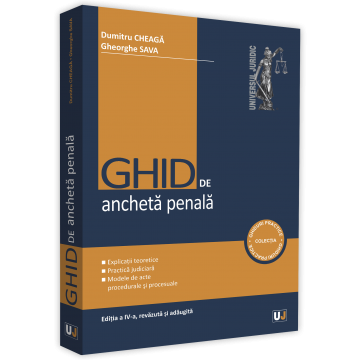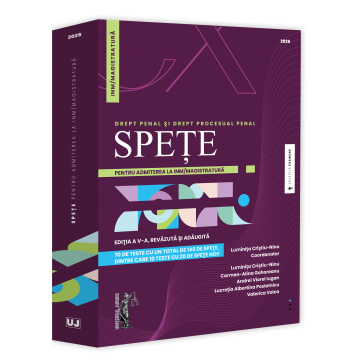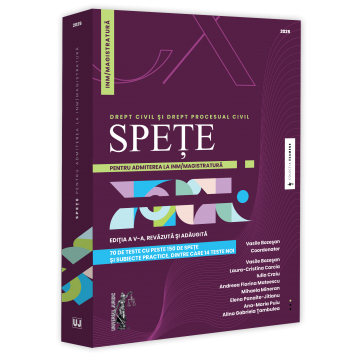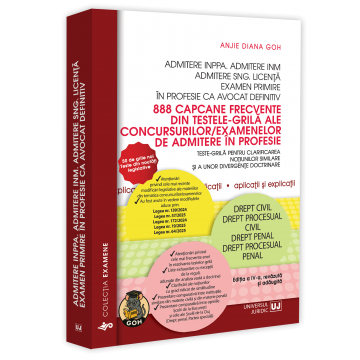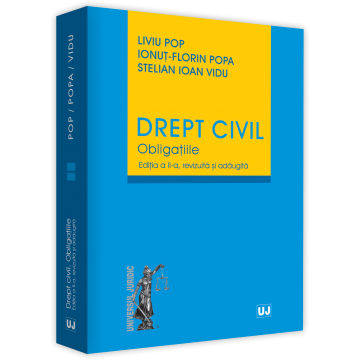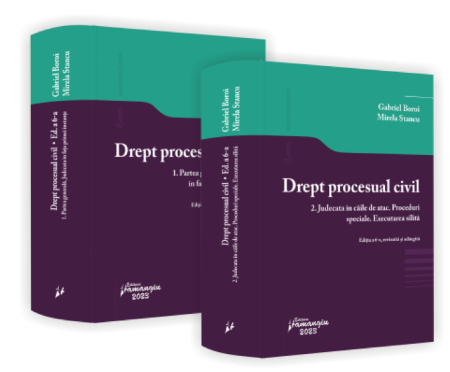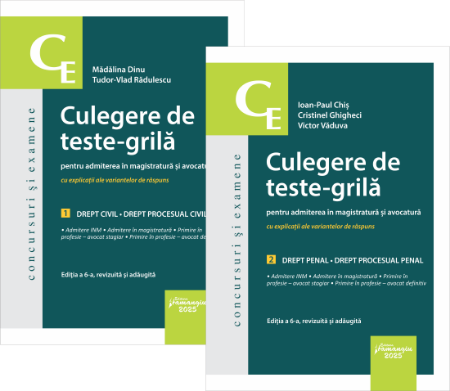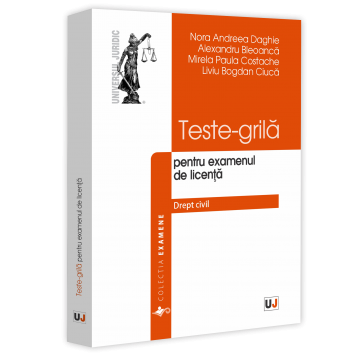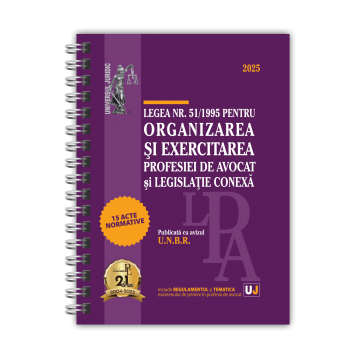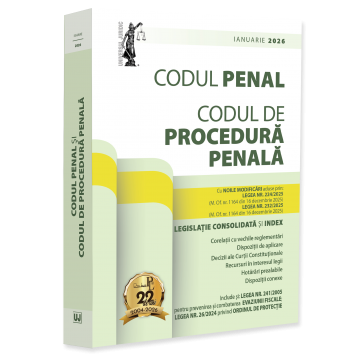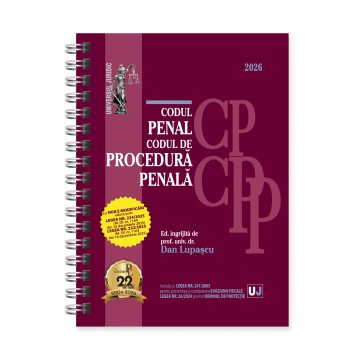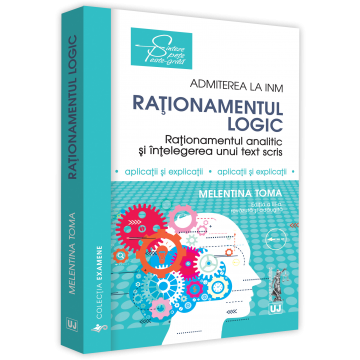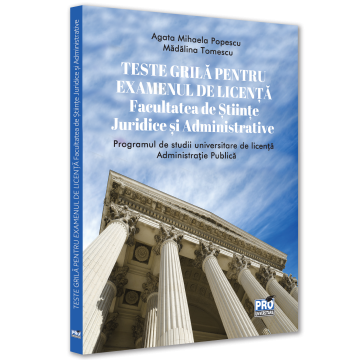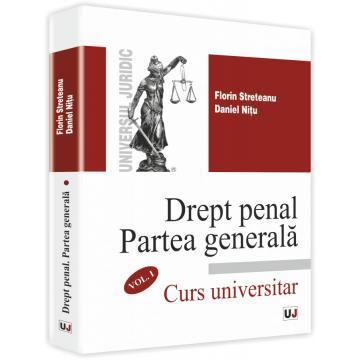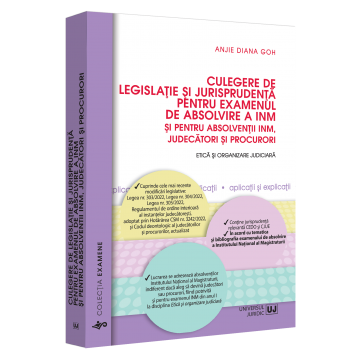Manuscript proposals: [email protected] / 0745 204 115 //// Tracking orders Individuals / Sales: 0745 200 357 / Orders Legal entities: 0721 722 783
Publisher: Universul Juridic
Author: Alexandru Ticlea
Pages: 360
Publisher year: 2019
ISBN: 978-606-39-0497-4
Product Code:
9786063904974
Do you need help?
0745 200 357
- Description
- Download (1)
- Authors
- Content
- More details
- Reviews (0)
The present paper was elaborated considering the need to provide students of law schools with the minimum bibliography necessary for their initial training in the field of oratory. Of course, it can also be consulted by students from other faculties - political and administrative sciences, communication sciences, etc.
The work can be useful for certain professional categories - lawyers, legal advisers, magistrates, etc. It may even interest ... politicians, to whom a separate chapter is dedicated, as well as any other person.
Readers will be amused by aphorisms, quatrains, epigrams and pamphlets about lawyers, politicians, magistrates. But, they will be saddened by the knowledge of the judicial errors committed in the trials presented in part III of the book (of Socrates, Jesus, Caragiale - Caion and Ceausescu).
The first part of the paper is dedicated to the generalities regarding the art in question and its evolution. Oratory art is a form of art (burnt), with a very special specific: it consists not only in the art of composing speeches, but also especially in that of speaking convincingly and beautifully in front of an audience. The discourse must be convincing, moving and pleasing (ut doceat, moveat et delectat).
Oratory art is realized and perfected by word, by speech. All people speak, the word being a human characteristic. But, while some delight and captivate us (whether they are speakers or not), others, on the contrary, "find it hard to hear" (Dimitrie Gusti). In the same first part we dealt with the emergence and flourishing of the oratory art, referring to the work and activity of some giants of ancient culture (Pythagoras, Socrates, Plato, Aristotle, Demosthenes, Cicero), the consecration of a new system of perennial government - democracy, without which our life today is inconceivable.
We could not step at the same time if we did not remember the great Romanian speakers, politicians and lawyers who contributed to the cultural development and modernization of our country (Mihail Kogalniceanu, Titu Maiorescu, Barbu Stefanescu Delavrancea, Nicolae Titulescu).
Part II of the paper is intended for the essence of oratorical art; it refers to:
- speech, the object of oratorical art;
- orator, the subject of oratorical art;
- oratory plastic, which looks at the way in which the speaker exposes his speech and in which he presents himself in front of the listener.
In particular, two categories of discourse are considered: legal discourse, namely the plea, the instrument of action of lawyers, and the political discourse, the instrument of action of politicians. As a result, substantial references are made, positive and negative, to the two categories of speakers (their mission and role, praise and criticism to which they have been and are subjected).
In the chapter entitled Oratory art are presented aspects regarding: gestural language, harmony of movements, the speaker's voice (diction, pronunciation, intonation, verbal tics), humor and communication (joke, irony, smile), the speaker's physique and clothing, the lawyer's robe.
We hope that, through the diversity and originality of the information gathered in this paper, we provide those interested with a tool for training and professional training, but also for relaxation and reflection ...
Prof. Alexandru Ticlea's book entitled "Oratory Art" is a fascinating foray into the theory and practice of "the art of speech", political discourse and legal advocacy. With a style that emphasizes the social contextualization of the word spoken by the speaker, Prof. Ticlea uses quotes of historical value and even a multitude of pamphlets, epigrams or articles from the tabloid press to capture the spirit of the times and the conditions to which they are subjected. speakers. In this sense, this paper takes us on the paths of history from ancient times to the present, giving us famous examples of oratorical eloquence, but also of discursive errors, both from the universal and national repertoire, contrasting in - in a somewhat antithetical way the samples of eloquence that the great orator of Antiquity and those of the modern period showed, blunders and errors that abound in the speeches of contemporary celebrities.
From the trial of the great philosopher Socrates and that of Jesus Christ, going through the exceptional pleas of Barbu Delavrancea in the courtrooms and to the "trial" of the Ceausescus, those passionate about the art of the spoken word will find in the pages of this paper a faithful mirror of what oratorical art means for man and society, related to the rigors and whims of different times.
Product compliance information
The work can be useful for certain professional categories - lawyers, legal advisers, magistrates, etc. It may even interest ... politicians, to whom a separate chapter is dedicated, as well as any other person.
Readers will be amused by aphorisms, quatrains, epigrams and pamphlets about lawyers, politicians, magistrates. But, they will be saddened by the knowledge of the judicial errors committed in the trials presented in part III of the book (of Socrates, Jesus, Caragiale - Caion and Ceausescu).
The first part of the paper is dedicated to the generalities regarding the art in question and its evolution. Oratory art is a form of art (burnt), with a very special specific: it consists not only in the art of composing speeches, but also especially in that of speaking convincingly and beautifully in front of an audience. The discourse must be convincing, moving and pleasing (ut doceat, moveat et delectat).
Oratory art is realized and perfected by word, by speech. All people speak, the word being a human characteristic. But, while some delight and captivate us (whether they are speakers or not), others, on the contrary, "find it hard to hear" (Dimitrie Gusti). In the same first part we dealt with the emergence and flourishing of the oratory art, referring to the work and activity of some giants of ancient culture (Pythagoras, Socrates, Plato, Aristotle, Demosthenes, Cicero), the consecration of a new system of perennial government - democracy, without which our life today is inconceivable.
We could not step at the same time if we did not remember the great Romanian speakers, politicians and lawyers who contributed to the cultural development and modernization of our country (Mihail Kogalniceanu, Titu Maiorescu, Barbu Stefanescu Delavrancea, Nicolae Titulescu).
Part II of the paper is intended for the essence of oratorical art; it refers to:
- speech, the object of oratorical art;
- orator, the subject of oratorical art;
- oratory plastic, which looks at the way in which the speaker exposes his speech and in which he presents himself in front of the listener.
In particular, two categories of discourse are considered: legal discourse, namely the plea, the instrument of action of lawyers, and the political discourse, the instrument of action of politicians. As a result, substantial references are made, positive and negative, to the two categories of speakers (their mission and role, praise and criticism to which they have been and are subjected).
In the chapter entitled Oratory art are presented aspects regarding: gestural language, harmony of movements, the speaker's voice (diction, pronunciation, intonation, verbal tics), humor and communication (joke, irony, smile), the speaker's physique and clothing, the lawyer's robe.
We hope that, through the diversity and originality of the information gathered in this paper, we provide those interested with a tool for training and professional training, but also for relaxation and reflection ...
Prof. Alexandru Ticlea's book entitled "Oratory Art" is a fascinating foray into the theory and practice of "the art of speech", political discourse and legal advocacy. With a style that emphasizes the social contextualization of the word spoken by the speaker, Prof. Ticlea uses quotes of historical value and even a multitude of pamphlets, epigrams or articles from the tabloid press to capture the spirit of the times and the conditions to which they are subjected. speakers. In this sense, this paper takes us on the paths of history from ancient times to the present, giving us famous examples of oratorical eloquence, but also of discursive errors, both from the universal and national repertoire, contrasting in - in a somewhat antithetical way the samples of eloquence that the great orator of Antiquity and those of the modern period showed, blunders and errors that abound in the speeches of contemporary celebrities.
From the trial of the great philosopher Socrates and that of Jesus Christ, going through the exceptional pleas of Barbu Delavrancea in the courtrooms and to the "trial" of the Ceausescus, those passionate about the art of the spoken word will find in the pages of this paper a faithful mirror of what oratorical art means for man and society, related to the rigors and whims of different times.
Mihai-Bogdan MARIAN
-
Oratory art - Alexandru Ticlea
Download
Alexandru Ticlea
Studies:
Bachelor of Laws (University of Bucharest, Faculty of Law: 1973-1977 - Department of Economic and Administrative Law; 1978-1982 - Department of Law); doctor of law (1989); has competences in Labor Law, Social Security Law, Civil Law, Commercial Law, Rhetoric.
Activities:
He is Vice President - Ecological University of Bucharest; Rector, PhD professor - Ecological University of Bucharest (2008-2016); lawyer - Bucharest Bar; president - Romanian Labor Law Association; founding director - Romanian Journal of Labor Law; associate member - Romanian Academy of Scientists; honorary president - Union of Experts in Labor Legislation; arbitrator - Arbitration Tribunal in Transports; corresponding member - Academy of Legal Sciences.
Doctor honoris causa:
- since December 2013 at the State University of Chisinau, Republic of Moldova;
- since May 2015 at the University of Wallachia in Targoviste;
- since September 2015 at Vasile Goldis University of Arad.
Publications:
- Published: 103 treatises, courses, monographs; 194 articles, studies, notes; 7 papers published abroad.
- Participated in numerous conferences, seminars, scientific symposia.
- He is a member of the scientific research committee on projects funded by the European Commission ("The right to strike in Europe", "Trade Union representation in the European Union member countries").
- Award-winning works: by the Union of Romanian Lawyers (Rhetoric, 2008, “Ioan Gruia” Award; Public Labor Law, 2011, Special Prize; Labor Law Treaty, 8th Edition, 2014, Honorary Diploma); by the Romanian Academy (Labor Law Treaty, 5th Edition, 2012, “Simion Barnutiu” Award).
Studies:
Bachelor of Laws (University of Bucharest, Faculty of Law: 1973-1977 - Department of Economic and Administrative Law; 1978-1982 - Department of Law); doctor of law (1989); has competences in Labor Law, Social Security Law, Civil Law, Commercial Law, Rhetoric.
Activities:
He is Vice President - Ecological University of Bucharest; Rector, PhD professor - Ecological University of Bucharest (2008-2016); lawyer - Bucharest Bar; president - Romanian Labor Law Association; founding director - Romanian Journal of Labor Law; associate member - Romanian Academy of Scientists; honorary president - Union of Experts in Labor Legislation; arbitrator - Arbitration Tribunal in Transports; corresponding member - Academy of Legal Sciences.
Doctor honoris causa:
- since December 2013 at the State University of Chisinau, Republic of Moldova;
- since May 2015 at the University of Wallachia in Targoviste;
- since September 2015 at Vasile Goldis University of Arad.
Publications:
- Published: 103 treatises, courses, monographs; 194 articles, studies, notes; 7 papers published abroad.
- Participated in numerous conferences, seminars, scientific symposia.
- He is a member of the scientific research committee on projects funded by the European Commission ("The right to strike in Europe", "Trade Union representation in the European Union member countries").
- Award-winning works: by the Union of Romanian Lawyers (Rhetoric, 2008, “Ioan Gruia” Award; Public Labor Law, 2011, Special Prize; Labor Law Treaty, 8th Edition, 2014, Honorary Diploma); by the Romanian Academy (Labor Law Treaty, 5th Edition, 2012, “Simion Barnutiu” Award).
content
ARGUMENT / 5
Part I. GENERALITIES REGARDING ORATORIC ART / 7
Chapter I. INTRODUCTION TO THE PROBLEMS OF ORATORIC ART / 9
The notion of art / 9
The specifics of the oratorical art / 10
Oratory - the art of speaking / 10
Content / 11
The orator - the "subject" of the oratorical art / 12
Beginnings of oratory / 14
Rhetoric - art and science / 15
Meanings of the term / 15
Definitions of rhetoric / 17
The brief evolution of the oratorical art / 20
Appearance and flowering / 20
Decline after the establishment of the Roman Empire / 21
The Middle Ages and oratorical art / 22
Renaissance and rhetoric / 23
The later course of rhetoric / 24
Oratory and rhetorical art in contemporaneity / 25
Rhetoric in Romania / 26
Chapter II. THE WORD - ESSENTIAL ELEMENT IN ORATORIC ART / 39
The primordiality of the word / 39
The word - the characteristic of man / 40
The word and rhetoric / 43
Measure or balance in words / 44
Humor and communication / 45
Definitions / 45
Gluma / 46
Irony / 47
Word and deed / 47
Silence in ... speech / 48
Chapter III. ANCIENT CONTRIBUTIONS TO THE APPEARANCE AND DEVELOPMENT OF ORATORIC ART / 55
The contribution of Pythagoras / 55
Short biography / 55
Ideas from the speeches of Pythagoras / 56
The laws of Pythagoras / 57
The contribution of Antiphon from Ramnus / 59
Antiphon - speaker and teacher / 59
The second tetralogy / 60
The contribution of Corax and his student Tisias / 66
The beginnings of judicial rhetoric / 66
Corax's dilemma / 67
The contribution of the sophists / 67
Sophists and their lessons / 67
Protagoras / 68
Gorgias / 69
Prodic / 71
Critique of the learning of sophists / 71
Plato's contribution / 73
The defining elements regarding the life and work of Plato / 73
Plato's attitude towards rhetoric / 74
The contribution of Aristotle / 77
Landmarks of Aristotle's activity and work / 77
Rehabilitation of rhetoric / 79
The contribution of Demosthenes / 81
Biographical data / 81
Demosthenes - great speaker / 82
Political speeches / 82
Legal discourses / 86
Cicero's contribution / 87
Biographical information / 87
Cicero - lawyer / 89
Cicero - a politician / 92
Cicero - about eloquence and orator / 99
Chapter IV. GREAT CLASSICS OF THE ROMANIAN ORATORY / 103
A possible selection / 103
Mihail Kogalniceanu / 103
Biographical data / 103
Mihail Kogalniceanu - politician / 106
Mihail Kogalniceanu - lawyer / 107
Oratory of Mihail Kogalniceanu / 108
Speech at the election of Alexandru Ioan Cuza as Lord of Moldova / 109
Speech in the Central Commission for fixing the Capital of the Principalities
United in Bucharest / 110
Barbu Stefanescu Delavrancea / 112
Biographical data / 112
Delavrancea - writer / 113
Delavrancea - great speaker / 114
Delavrancea - politician / 114
The plea of the lawyer Delavrancea in the trial of the architect Socolescu (Selections) / 116
Nicolae Titulescu / 126
Biographical data / 126
Nicolae Titulescu - eminent jurist / 129
Nicolae Titulescu - politician and diplomat / 130
Nicolae Titulescu - great speaker / 133
Contributions in solving the process of the Hungarian optants / 135
Romania's position on the events in the Balkans (1912-1913) / 136
Part II. THE ESSENCE OF ORATORIC ART / 141
Chapter V. SPEECH / 143
Notion / 143
Classifications of discourse / 144
Discourse structure / 146
Preparing the speech / 153
Style and style figures in oratorical art / 155
His style and qualities / 155
Style figures and their importance / 159
The plea - the judicial speech of the lawyers / 165
General rules / 165
The importance of oral conclusions / 174
Characteristics of political discourse / 175
Conciseness of speech / 179
Speech, read or unread? / 181
Chapter VI. ORATORIC PLASTICS / 183
Explanations / 183
The significance of sign language / 183
Physiognomy / 184
Smile / 186
Hands / 187
Harmony of gestures / 188
The speaker's voice / 189
Important / 189
Voice characteristics / 190
Diction or pronunciation / 192
Verbal tics / 193
Humor and communication / 193
Definitions / 193
Gluma / 194
Irony / 195
Laughter / 196
Tracul / 199
Speaker - audience relationship / 200
The physique of the speaker / 202
Speaker's clothing / 202
Lawyer's robe / 203
CHAPTER VII. LAWYERS / 205
Preliminaries / 205
Law in Romania's past / 205
Eminescu and law / 206
Women and law / 207
The lawyer during the communist period / 209
Characteristics of the legal profession / 211
The lawyer 's mission / 212
The vocation lawyer / 215
Requirements of the legal profession / 217
Qualities and defects / 217
Correctness of the lawyer / 219
Writing and speaking / 220
Conviction of the judge - the purpose of the lawyer / 221
Lawyers and magistrates / 222
Judges in ... pamphlets / 226
The ignorant judge / 226
The indolent judge / 227
The treacherous judge / 228
To some magistrates / 228
Lawyers and politics / 229
You also have good thoughts about lawyers / 230
Lawyers in epigrams / 233
Patania of the deceased lawyer, fraudulently arrived in Heaven / 235
Chapter VIII. POLITICIANS / 238
Terminological specifications / 238
Opinions about politics and politicians - history and actuality / 238
From Confucius' ideas on government / 253
Importance and rvoter responsibility / 255
Other paradoxes of democracy / 262
Characterizations and "sayings" of some politicians today / 263
Preliminary considerations / 263
Ion Iliescu / 263
Traian Basescu / 265
Klaus Iohannis / 271
Viorica Dancila / 274
Viorel Ponta / 276
Other politicians and their blunders / 278
Conclusions / 283
Part III. FAMOUS TRIALS / 285
Chapter IX. THE TRIAL OF SOCRATES / 287
Socrates - biographical data / 287
The accusations / 289
Tribunal and judicial procedure / 290
Defense / 291
Verdict / 295
The last word / 296
Conclusions / 297
"Re-trial" of the trial / 298
Chapter X. THE TRIAL OF JESUS / 299
Proceedings prior to the arrest of Jesus by Pilate / 299
The impression of Pilate's wife produced at the sight of Jesus and the discussion she had with her husband / 301
Entrance to the Temple / 302
The Betrayal of Judas / 303
Investigation and judgment of Jesus by the Jewish authorities / 304
Pilate's Judgment / 306
Judgment of conviction / 307
Review of the process / 309
Chapter XI. CARAGIALE PROCESS - CAION / 311
Caragiale's irony / 311
Caion accuses of plagiarism / 311
Summary of the drama Napasta / 312
Caragiale's reaction: he addresses justice / 313
Echoes in the press and taking positions. New charges / 314
Process development / 315
Delavrancea's plea / 316
The decision of the court / 320
Trial retrial / 320
Restoring the truth / 321
Chapter XII. CEAUSESCU'S TRIAL / 322
Nicolae Ceausescu - leader and "beloved son of the Romanian people" / 322
The international context that favored the abolition of the Ceausescu regime / 324
The beginning ... the end / 327
Diversion / 327
Organization of the trial / 330
Execution / 331
Communiqué of the Council of the National Salvation Front / 332
Trial retrial / 332
Process transcript / 333
Why Ceausescu was killed - an opinion / 349
A revaluation / 354
ARGUMENT / 5
Part I. GENERALITIES REGARDING ORATORIC ART / 7
Chapter I. INTRODUCTION TO THE PROBLEMS OF ORATORIC ART / 9
The notion of art / 9
The specifics of the oratorical art / 10
Oratory - the art of speaking / 10
Content / 11
The orator - the "subject" of the oratorical art / 12
Beginnings of oratory / 14
Rhetoric - art and science / 15
Meanings of the term / 15
Definitions of rhetoric / 17
The brief evolution of the oratorical art / 20
Appearance and flowering / 20
Decline after the establishment of the Roman Empire / 21
The Middle Ages and oratorical art / 22
Renaissance and rhetoric / 23
The later course of rhetoric / 24
Oratory and rhetorical art in contemporaneity / 25
Rhetoric in Romania / 26
Chapter II. THE WORD - ESSENTIAL ELEMENT IN ORATORIC ART / 39
The primordiality of the word / 39
The word - the characteristic of man / 40
The word and rhetoric / 43
Measure or balance in words / 44
Humor and communication / 45
Definitions / 45
Gluma / 46
Irony / 47
Word and deed / 47
Silence in ... speech / 48
Chapter III. ANCIENT CONTRIBUTIONS TO THE APPEARANCE AND DEVELOPMENT OF ORATORIC ART / 55
The contribution of Pythagoras / 55
Short biography / 55
Ideas from the speeches of Pythagoras / 56
The laws of Pythagoras / 57
The contribution of Antiphon from Ramnus / 59
Antiphon - speaker and teacher / 59
The second tetralogy / 60
The contribution of Corax and his student Tisias / 66
The beginnings of judicial rhetoric / 66
Corax's dilemma / 67
The contribution of the sophists / 67
Sophists and their lessons / 67
Protagoras / 68
Gorgias / 69
Prodic / 71
Critique of the learning of sophists / 71
Plato's contribution / 73
The defining elements regarding the life and work of Plato / 73
Plato's attitude towards rhetoric / 74
The contribution of Aristotle / 77
Landmarks of Aristotle's activity and work / 77
Rehabilitation of rhetoric / 79
The contribution of Demosthenes / 81
Biographical data / 81
Demosthenes - great speaker / 82
Political speeches / 82
Legal discourses / 86
Cicero's contribution / 87
Biographical information / 87
Cicero - lawyer / 89
Cicero - a politician / 92
Cicero - about eloquence and orator / 99
Chapter IV. GREAT CLASSICS OF THE ROMANIAN ORATORY / 103
A possible selection / 103
Mihail Kogalniceanu / 103
Biographical data / 103
Mihail Kogalniceanu - politician / 106
Mihail Kogalniceanu - lawyer / 107
Oratory of Mihail Kogalniceanu / 108
Speech at the election of Alexandru Ioan Cuza as Lord of Moldova / 109
Speech in the Central Commission for fixing the Capital of the Principalities
United in Bucharest / 110
Barbu Stefanescu Delavrancea / 112
Biographical data / 112
Delavrancea - writer / 113
Delavrancea - great speaker / 114
Delavrancea - politician / 114
The plea of the lawyer Delavrancea in the trial of the architect Socolescu (Selections) / 116
Nicolae Titulescu / 126
Biographical data / 126
Nicolae Titulescu - eminent jurist / 129
Nicolae Titulescu - politician and diplomat / 130
Nicolae Titulescu - great speaker / 133
Contributions in solving the process of the Hungarian optants / 135
Romania's position on the events in the Balkans (1912-1913) / 136
Part II. THE ESSENCE OF ORATORIC ART / 141
Chapter V. SPEECH / 143
Notion / 143
Classifications of discourse / 144
Discourse structure / 146
Preparing the speech / 153
Style and style figures in oratorical art / 155
His style and qualities / 155
Style figures and their importance / 159
The plea - the judicial speech of the lawyers / 165
General rules / 165
The importance of oral conclusions / 174
Characteristics of political discourse / 175
Conciseness of speech / 179
Speech, read or unread? / 181
Chapter VI. ORATORIC PLASTICS / 183
Explanations / 183
The significance of sign language / 183
Physiognomy / 184
Smile / 186
Hands / 187
Harmony of gestures / 188
The speaker's voice / 189
Important / 189
Voice characteristics / 190
Diction or pronunciation / 192
Verbal tics / 193
Humor and communication / 193
Definitions / 193
Gluma / 194
Irony / 195
Laughter / 196
Tracul / 199
Speaker - audience relationship / 200
The physique of the speaker / 202
Speaker's clothing / 202
Lawyer's robe / 203
CHAPTER VII. LAWYERS / 205
Preliminaries / 205
Law in Romania's past / 205
Eminescu and law / 206
Women and law / 207
The lawyer during the communist period / 209
Characteristics of the legal profession / 211
The lawyer 's mission / 212
The vocation lawyer / 215
Requirements of the legal profession / 217
Qualities and defects / 217
Correctness of the lawyer / 219
Writing and speaking / 220
Conviction of the judge - the purpose of the lawyer / 221
Lawyers and magistrates / 222
Judges in ... pamphlets / 226
The ignorant judge / 226
The indolent judge / 227
The treacherous judge / 228
To some magistrates / 228
Lawyers and politics / 229
You also have good thoughts about lawyers / 230
Lawyers in epigrams / 233
Patania of the deceased lawyer, fraudulently arrived in Heaven / 235
Chapter VIII. POLITICIANS / 238
Terminological specifications / 238
Opinions about politics and politicians - history and actuality / 238
From Confucius' ideas on government / 253
Importance and rvoter responsibility / 255
Other paradoxes of democracy / 262
Characterizations and "sayings" of some politicians today / 263
Preliminary considerations / 263
Ion Iliescu / 263
Traian Basescu / 265
Klaus Iohannis / 271
Viorica Dancila / 274
Viorel Ponta / 276
Other politicians and their blunders / 278
Conclusions / 283
Part III. FAMOUS TRIALS / 285
Chapter IX. THE TRIAL OF SOCRATES / 287
Socrates - biographical data / 287
The accusations / 289
Tribunal and judicial procedure / 290
Defense / 291
Verdict / 295
The last word / 296
Conclusions / 297
"Re-trial" of the trial / 298
Chapter X. THE TRIAL OF JESUS / 299
Proceedings prior to the arrest of Jesus by Pilate / 299
The impression of Pilate's wife produced at the sight of Jesus and the discussion she had with her husband / 301
Entrance to the Temple / 302
The Betrayal of Judas / 303
Investigation and judgment of Jesus by the Jewish authorities / 304
Pilate's Judgment / 306
Judgment of conviction / 307
Review of the process / 309
Chapter XI. CARAGIALE PROCESS - CAION / 311
Caragiale's irony / 311
Caion accuses of plagiarism / 311
Summary of the drama Napasta / 312
Caragiale's reaction: he addresses justice / 313
Echoes in the press and taking positions. New charges / 314
Process development / 315
Delavrancea's plea / 316
The decision of the court / 320
Trial retrial / 320
Restoring the truth / 321
Chapter XII. CEAUSESCU'S TRIAL / 322
Nicolae Ceausescu - leader and "beloved son of the Romanian people" / 322
The international context that favored the abolition of the Ceausescu regime / 324
The beginning ... the end / 327
Diversion / 327
Organization of the trial / 330
Execution / 331
Communiqué of the Council of the National Salvation Front / 332
Trial retrial / 332
Process transcript / 333
Why Ceausescu was killed - an opinion / 349
A revaluation / 354
The present paper was elaborated considering the need to provide students of law schools with the minimum bibliography necessary for their initial training in the field of oratory. Of course, it can also be consulted by students from other faculties - political and administrative sciences, communication sciences, etc.
The work can be useful for certain professional categories - lawyers, legal advisers, magistrates, etc. It may even interest ... politicians, to whom a separate chapter is dedicated, as well as any other person.
Readers will be amused by aphorisms, quatrains, epigrams and pamphlets about lawyers, politicians, magistrates. But, they will be saddened by the knowledge of the judicial errors committed in the trials presented in part III of the book (of Socrates, Jesus, Caragiale - Caion and Ceausescu).
The first part of the paper is dedicated to the generalities regarding the art in question and its evolution. Oratory art is a form of art (burnt), with a very special specific: it consists not only in the art of composing speeches, but also especially in that of speaking convincingly and beautifully in front of an audience. The discourse must be convincing, moving and pleasing (ut doceat, moveat et delectat).
Oratory art is realized and perfected by word, by speech. All people speak, the word being a human characteristic. But, while some delight and captivate us (whether they are speakers or not), others, on the contrary, "find it hard to hear" (Dimitrie Gusti). In the same first part we dealt with the emergence and flourishing of the oratory art, referring to the work and activity of some giants of ancient culture (Pythagoras, Socrates, Plato, Aristotle, Demosthenes, Cicero), the consecration of a new system of perennial government - democracy, without which our life today is inconceivable.
We could not step at the same time if we did not remember the great Romanian speakers, politicians and lawyers who contributed to the cultural development and modernization of our country (Mihail Kogalniceanu, Titu Maiorescu, Barbu Stefanescu Delavrancea, Nicolae Titulescu).
Part II of the paper is intended for the essence of oratorical art; it refers to:
- speech, the object of oratorical art;
- orator, the subject of oratorical art;
- oratory plastic, which looks at the way in which the speaker exposes his speech and in which he presents himself in front of the listener.
In particular, two categories of discourse are considered: legal discourse, namely the plea, the instrument of action of lawyers, and the political discourse, the instrument of action of politicians. As a result, substantial references are made, positive and negative, to the two categories of speakers (their mission and role, praise and criticism to which they have been and are subjected).
In the chapter entitled Oratory art are presented aspects regarding: gestural language, harmony of movements, the speaker's voice (diction, pronunciation, intonation, verbal tics), humor and communication (joke, irony, smile), the speaker's physique and clothing, the lawyer's robe.
We hope that, through the diversity and originality of the information gathered in this paper, we provide those interested with a tool for training and professional training, but also for relaxation and reflection ...
Prof. Alexandru Ticlea's book entitled "Oratory Art" is a fascinating foray into the theory and practice of "the art of speech", political discourse and legal advocacy. With a style that emphasizes the social contextualization of the word spoken by the speaker, Prof. Ticlea uses quotes of historical value and even a multitude of pamphlets, epigrams or articles from the tabloid press to capture the spirit of the times and the conditions to which they are subjected. speakers. In this sense, this paper takes us on the paths of history from ancient times to the present, giving us famous examples of oratorical eloquence, but also of discursive errors, both from the universal and national repertoire, contrasting in - in a somewhat antithetical way the samples of eloquence that the great orator of Antiquity and those of the modern period showed, blunders and errors that abound in the speeches of contemporary celebrities.
From the trial of the great philosopher Socrates and that of Jesus Christ, going through the exceptional pleas of Barbu Delavrancea in the courtrooms and to the "trial" of the Ceausescus, those passionate about the art of the spoken word will find in the pages of this paper a faithful mirror of what oratorical art means for man and society, related to the rigors and whims of different times.
The work can be useful for certain professional categories - lawyers, legal advisers, magistrates, etc. It may even interest ... politicians, to whom a separate chapter is dedicated, as well as any other person.
Readers will be amused by aphorisms, quatrains, epigrams and pamphlets about lawyers, politicians, magistrates. But, they will be saddened by the knowledge of the judicial errors committed in the trials presented in part III of the book (of Socrates, Jesus, Caragiale - Caion and Ceausescu).
The first part of the paper is dedicated to the generalities regarding the art in question and its evolution. Oratory art is a form of art (burnt), with a very special specific: it consists not only in the art of composing speeches, but also especially in that of speaking convincingly and beautifully in front of an audience. The discourse must be convincing, moving and pleasing (ut doceat, moveat et delectat).
Oratory art is realized and perfected by word, by speech. All people speak, the word being a human characteristic. But, while some delight and captivate us (whether they are speakers or not), others, on the contrary, "find it hard to hear" (Dimitrie Gusti). In the same first part we dealt with the emergence and flourishing of the oratory art, referring to the work and activity of some giants of ancient culture (Pythagoras, Socrates, Plato, Aristotle, Demosthenes, Cicero), the consecration of a new system of perennial government - democracy, without which our life today is inconceivable.
We could not step at the same time if we did not remember the great Romanian speakers, politicians and lawyers who contributed to the cultural development and modernization of our country (Mihail Kogalniceanu, Titu Maiorescu, Barbu Stefanescu Delavrancea, Nicolae Titulescu).
Part II of the paper is intended for the essence of oratorical art; it refers to:
- speech, the object of oratorical art;
- orator, the subject of oratorical art;
- oratory plastic, which looks at the way in which the speaker exposes his speech and in which he presents himself in front of the listener.
In particular, two categories of discourse are considered: legal discourse, namely the plea, the instrument of action of lawyers, and the political discourse, the instrument of action of politicians. As a result, substantial references are made, positive and negative, to the two categories of speakers (their mission and role, praise and criticism to which they have been and are subjected).
In the chapter entitled Oratory art are presented aspects regarding: gestural language, harmony of movements, the speaker's voice (diction, pronunciation, intonation, verbal tics), humor and communication (joke, irony, smile), the speaker's physique and clothing, the lawyer's robe.
We hope that, through the diversity and originality of the information gathered in this paper, we provide those interested with a tool for training and professional training, but also for relaxation and reflection ...
Prof. Alexandru Ticlea's book entitled "Oratory Art" is a fascinating foray into the theory and practice of "the art of speech", political discourse and legal advocacy. With a style that emphasizes the social contextualization of the word spoken by the speaker, Prof. Ticlea uses quotes of historical value and even a multitude of pamphlets, epigrams or articles from the tabloid press to capture the spirit of the times and the conditions to which they are subjected. speakers. In this sense, this paper takes us on the paths of history from ancient times to the present, giving us famous examples of oratorical eloquence, but also of discursive errors, both from the universal and national repertoire, contrasting in - in a somewhat antithetical way the samples of eloquence that the great orator of Antiquity and those of the modern period showed, blunders and errors that abound in the speeches of contemporary celebrities.
From the trial of the great philosopher Socrates and that of Jesus Christ, going through the exceptional pleas of Barbu Delavrancea in the courtrooms and to the "trial" of the Ceausescus, those passionate about the art of the spoken word will find in the pages of this paper a faithful mirror of what oratorical art means for man and society, related to the rigors and whims of different times.
Mihai-Bogdan MARIAN
If you want to express your opinion about this product you can add a review.
write a review

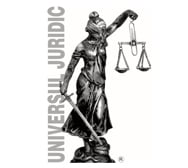
![Oratory art - Alexandru Ticlea [1] Oratory art - Alexandru Ticlea [1]](https://gomagcdn.ro/domains/editurauniversitara.ro/files/product/large/oratory-art-alexandru-ticlea-3170-2599.png)
